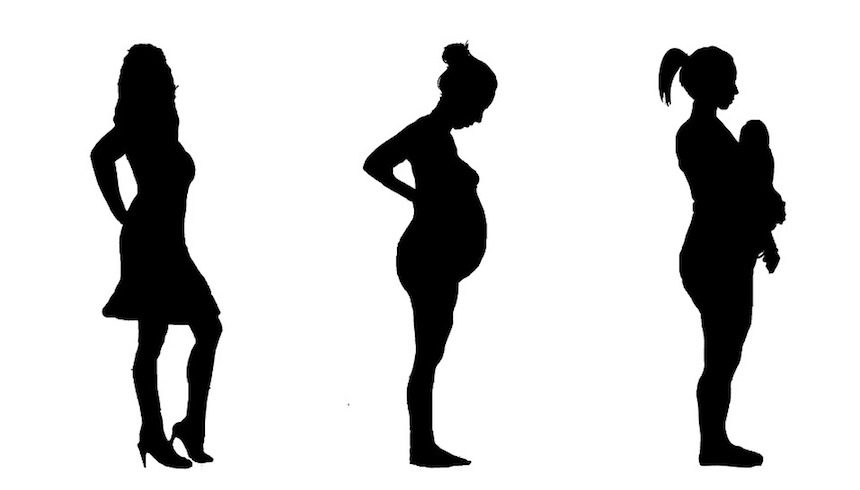Maternity Benefit:
Maternity Benefit Act, 1961 is applicable to every factory, shop or establishment, where 10 or more people are or were employed at any given point of time in the preceding 12 months.
It is an Act to regulate the employment of women in certain establishments for certain periods before and after child-birth and to provide for maternity benefit and certain other benefits.
The Maternity Benefit (Amendment) Bill, 2016 was passed in Rajya Sabha on August 11, 2016. Subsequently, passed in the Lok Sabha on March 9, 2017. It was passed by the Rajya Sabha on August 11, 2016, and received President’s assent on 27 March, 2017, and finally came into force on 1 April, 2017. The 2017 Act brought about some of most landmark changes in the 1961 Act.
Changes brought about by Maternity Benefit (Amendment) Act 2017:
(i) Defines commissioning mother as a biological mother who uses her egg to create an embryo implanted in any other woman.
(ii) Amends Section 5 of the 1961 Act to increase the maternity leave to 26 weeks from 12 weeks of which 8 weeks is for pre-natal leave instead earlier 6 weeks.
(iii) It adds a proviso to Section 5 stating that women having two or more kids shall be entitled to a maternity leave of 12 weeks of which 6 weeks is for pre-natal leave.
(iv) It adds sub-section 4 to Section 5 of the 1961 Act providing that a woman who legally adopts a child below the age of three months and a commissioning mother shall be entitled to a maternity leave of twelve weeks from the date the child is handed over to the adopting or commissioning mother.
Apart from this, the Act also provides various benefits to the working women:
(v) Addition of sub-section 5 to Section 5 provides the woman a chance to work from home if the employer allows after availing the maternity benefit on such conditions mutually agreed by the woman and employer
(vi) The Amendment inserts Section 11A to the 1961 Act which provides for the facility of creche in every establishment having 50 or more people. It also allows the woman four visits a day to creche including interval for rest.
(vii) Section 11A also prescribes that every establishment shall intimate the woman in writing and electronically about her benefits under the Act during the initial appointment.
Besides this, the Maternity Benefit Act, 1961 already provided various benefits to the women. Some of them are listen below for the sake of convenience:
(i) No post-natal Exertion:
As per Section 4 of the 1961 Act, no woman can be employed or do any work in any establishment for a period of six weeks following her delivery or miscarriage.
Further, on a written request made by the woman, for a period of one month immediately preceding the period of six weeks before the date of her delivery, and during the period of six weeks for which the pregnant woman does not avail leave of absence, she cannot be made to do any work of arduous nature or which involves long hours of standing or is likely to interfere with her pregnancy or foetal development, or may cause miscarriage or adversely affect her health.
(ii) Right to Payment:
As per Section 5(1) of the 1961 Act, every woman shall be entitled to payment at the rate of the average daily wage for the period of her actual absence immediately preceding and including the day of her delivery and for the six weeks immediately following that day.
Average daily wage means average of the wage payable to her for a period of 3 months immediately preceding the date from which she absents herself on account of maternity.
Section 5 provides a proviso stating that a woman is not entitled to maternity benefit unless she has worked in the employer’s establishment for a period of at least 160 days in the 12 months immediately preceding the date of her delivery.
- Work from Home benefit:
The 2017 Amendment Act inserts clause (5) to Section 5 which provides that if the nature of work that the woman does allows her to work from home, then may allow her to avail this benefit after her maternity leave has been availed on terms and conditions mutually agreed by the employer and the employee.
- Maternity benefit on death:
The proviso to Section 5(3) of the 1961 states that if the woman dies any time during the period of her maternity leave, maternity benefit shall be payable only for the days up to and including her day of death.
The section has a further proviso, which states that –
- if the woman dies leaving behind the child, during delivery or during the period of six months immediately after her date of delivery, the employer shall be liable to maternity benefit for the entire period of 6 weeks immediately following the date of delivery.
- However, if the child also dies during the said period, then the employer shall be liable to pay only for the days up to and including her date of death.
- Medical Bonus:
Section 8 of the 1961 Act provides that every woman is entitled to maternity bonus from the employer if no pre-natal confinement and post-natal care is provided free of cost.
- Nursing Breaks:
As per Section 11 of the 1961 Act, any woman who returns to work after delivery shall apart from the interval of rest allowed for her, also be entitled to two breaks of a prescribed duration in the course of her daily work for nursing the child until the child attains the age of fifteen months.
- No dismissal during absence or pregnancy:
As per Section 12 of the 1961 Act, it is unlawful for an employer to dismiss or discharge a woman during her maternity absence or give notice of the same on such a day that the notice will expire during such absence, or to vary any conditions of service to her disadvantage.
Further, even if a woman is discharged or dismissed during her pregnancy, then she cannot be deprived of the maternity benefits unless she has been dismissed due to a prescribed gross misconduct.
- No deduction of wages:
Section 13 of the 1961 Act provides that no woman’s wages can be deducted by virtue of providing maternity benefit such as not making her do any form of arduous work as per Section 4(3) or due to her availing nursing breaks as provided under Section 11 of the 1961 Act.
Criticisms:
One of the major criticisms against this Act is the fact that it benefits only women working in organised sector, whereas majority of the women in India work in unorganised sector. Besides, there are women who work under contract labour, casual labour etc.
Another major criticism is the absence of paternity leave in the Act. Efficient rearing of a child is the responsibility of both mother and father. It is important for the father to be with the child in the early days so develop a bond with the child as well as provide a helping hand to the mother by sharing the responsibilities. However, the absence of a provision to this effect inevitably reinforces gender discrimination.
The Act discriminates against adoptive and commissioning mother by providing them just 12 weeks of maternity leave.
Positives:
While the criticisms hold good to a large extent, the Act is a landmark moment as it is progressive in nature and will benefit 1.8 million working women. Also, even though it is being criticised for discriminating against the third child, the Act is inherently providing an incentive for family planning and population control.
The move could being out parity in labour force as it would encourage more female participation. The Act would place India third in terms of number of weeks of maternity leave provided after Canada that provides 50 weeks and Norway that provides 44 weeks.
Conclusion:
In spite of the positive steps taken, the Act has a long way to go before it abdicates gender discrimination. Even though the Act focuses on providing adequate leave and other benefits to women in order to protect their health and the baby’s wellbeing. However, corporate world is known to be cruel to women especially after they come back from maternity leaves. In order to avoid this prejudice in the minds of the employers, there should have been a provision to enable smooth return to work.
Picture Courtesy: Pixabay







